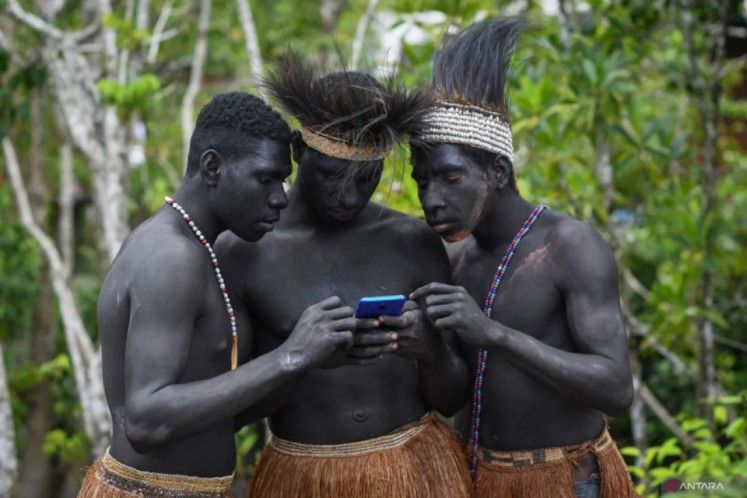Popular Reads
Top Results
Can't find what you're looking for?
View all search resultsPopular Reads
Top Results
Can't find what you're looking for?
View all search resultsListening to the youth: Are we all ready?
Indonesia now has a youth population of about 64 million, but how far are we ready to meaningfully engage them in achieving “Gold Indonesia 2045” – when we are supposed to be a great, competitive nation? How willing is the government to involve them in planning, implementing and evaluating national programs that claim to accommodate their interests?
Change text size
Gift Premium Articles
to Anyone
E
very year, the arrival of Youth Pledge Day on Oct. 28 reminds us Indonesians not to take the youth for granted. Without the impatient youth, our founding fathers might not have proclaimed independence on Aug. 17, 1945 and we might not have become independent until much later. Without the young, there might have been no people who challenged the House of Representatives, resulting in the decision to postpone the ratification of several controversial draft bills last September.
Indonesia now has a youth population of about 64 million, but how far are we ready to meaningfully engage them in achieving “Gold Indonesia 2045” – when we are supposed to be a great, competitive nation? How willing is the government to involve them in planning, implementing and evaluating national programs that claim to accommodate their interests?
Currently, the world has 1.8 billion youths aged 10 to 24 years old, which according to the United Nations is the biggest youth population ever. The UN said 90 percent of the youth now reside in developing countries, including 26 percent in the Asia-Pacific. Realizing their potential, the UN issued a grand strategy to drive meaningful youth engagement in development under UN Youth 2030: Working With and For Young People.
According to the World Health Organization, meaningful youth engagement in development requires space, voices, influence and an audience. Yet, the youth face challenges in engaging meaningfully. Based on a study on youth civic engagement in the United States, the youth face social, cultural and political barriers. Government commitment is among the political barriers, while other issues include generational conflict, patrimonial culture and the gender gap. Such barriers effectively neglect the youth in almost all decision-making processes.
Most Indonesians, for instance, still discriminate on the basis of age and gender, which prevents the youth from shaping the nation’s future. Bold-sounding youth, for instance, are often labeled unruly.
Engaging the youth in civic and political activities will contribute significantly to national development. According to the Youth Engagement and Empowerment Report on Jordan, Morocco and Tunisia by the Organization for Economic Cooperation and Development, their participation also ensures responsive results to citizens’ needs, ultimately strengthening the legitimacy of political decisions, a democratic culture and trust in public institutions.
Based on research published by Indonesia’s Youth and Sports Ministry in 2014, young people still feel excluded from development programs. The government still largely treats them as mere objects of development rather than empowering them as actors. Youth participation in general is neglected, especially among young people from vulnerable or minority groups.
The ministry, whose main responsibility is to accommodate youth interests in Indonesia, has yet to carry out its functions effectively, what with an annual operational budget of below 2 percent of the state budget.
However, youth empowerment programs are also carried out under other ministries, such as the ministries of health and manpower.
Presidential Regulation No. 66/2017 aims to synergize all youth programs in the country. However, there is no integrated youth database that keeps a record on youth leaders in communities, their initiatives and the sustainability of various training and capacity building workshops for youths under various ministries – at least one that can be publicly accessed and regularly updated.
This data is needed as a reference for better efforts to get the youth to collaborate, to get to know each other and to possibly ignite a bigger initiative that could position the youth as the nation’s strategic leaders.
Indonesia could learn from Bahrain and Argentina. Around 16,000 people from Bahrain aged 15 to 30 years old were involved in the formulation of national youth policies. Their aspirations were identified and mapped through surveys and focus group discussions that later became the basis of youth-friendly policies. In Argentina, approximately 1,000 young people are engaged in the design and implementation of annual local services to reflect their needs and interests.
Also, let’s not forget how our university students mobilized massive protests to delay problematic laws. Indeed, the youth possess the capability and ability to change the course of the nation.
Last March, the Health Ministry together with WHO and the CISDI presented, for the first time, a national youth town hall. The town hall, attended by more than 1,200 youths from all over Indonesia, allowed participants to voice their aspirations on how they wanted to be involved in the development agenda. The town hall might be a tiny but valuable step toward better youth empowerment in the country.
However, many of us need to be ready to change our attitudes by no longer looking down on young people and no longer dismissing their views.
***
Yeyen Yenuarizki is a communication for development specialist, Kartika Febriana is a knowledge management officer and Nadhira Febianisari is a communication officer at the Center for Indonesia’s Strategic Development Initiatives (CISDI). The CISDI was the official partner of the National Youth Town Hall event in March, in cooperation with the Health Ministry and the World Health Organization.











